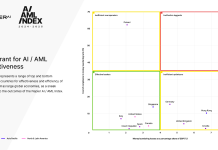From the huge Danske Bank scandal to a rising number of reports in the UK, money laundering is a growing concern for finance ministers in the EU.
Now they are set to do something about it by gearing up to ask the European Commission to create a dedicated anti-money laundering (AML) authority in the EU.
Their intentions were leaked in October when the Financial Times reported having seen a draft statement about the move.
The European finance ministers were apparently supposed to pitch the idea to the commission in December. Now, a draft document seen by Bloomberg suggests that they are set to agree on recommendations by Thursday in Brussels.
Some RegTech stakeholders RegTech Analyst spoke with when the plans first become public were optimistic about the push.
“I am a very strong supporter of an anti-money laundering authority – it’s something I’ve been suggesting for many years,” Remonda Kirketerp-Møller, founder and CEO, muinmos, the onboarding RegTech company, told RegTech Analyst at the time. “The regulators simply do not have the bandwidth to cover this in addition to their other supervision work.
Others, like Stephen Platt, chairman of KYC Global Technologies, the RegTech company, were not equally enthused.
“It’s a classic Eurocrat reaction to criticism for lack of action by some EU member states and most national regulators to date,” he told RegTech Analyst. “What is a pan European authority going to do that national regulatory authorities should be able to do but can’t or won’t?
No matter what the end result will be, one thing is clear: there have been no shortage of money laundering affairs to motivate the move for a new AML authority.
For instance, in 2017 when it was revealed that Danish Danske Bank’s Estonian office had been used to launder roughly €200bn ($223.05bn). Danske Bank has lost two-thirds of its value since the scandal broke.
The scandal has spiralled to include Deutsche Bank and Swedbank when it was revealed that they had facilitated some of the transfers. Swedban’s chairman and the old CEO were made redundant as a consequence of the scandal.
Now defunct Latvian bank ABLV was accused by US authorities in February 2018 to have funnelled illegal money and was promptly denied US dollar funding. Depositors consequently rushed to empty their accounts until the European Central Bank froze all payments going out of ABLV. About a week later the bank was forced to shut down.
Copyright © 2018 RegTech Analyst






